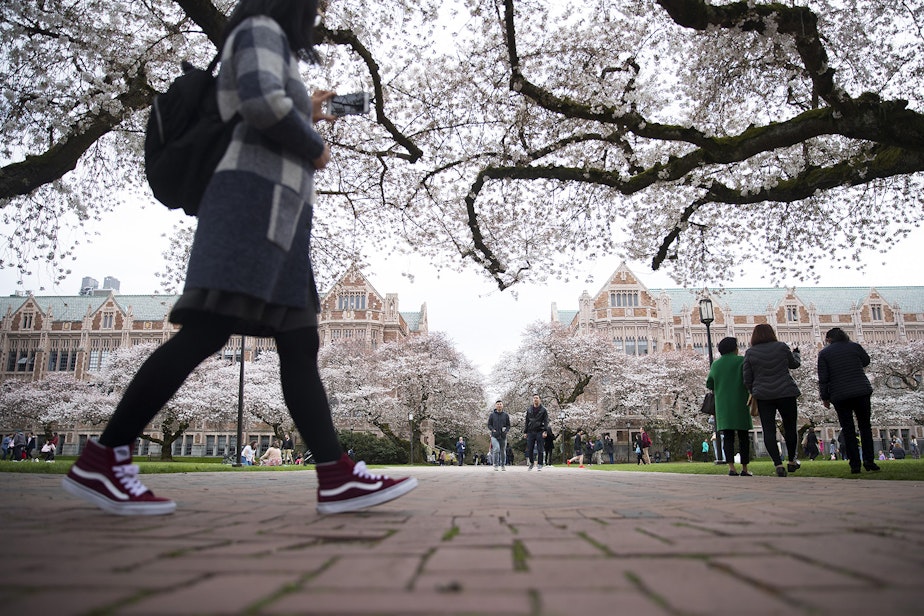Tax hike on Amazon and Microsoft will help pay college tuition

Washington Governor Jay Inslee is expected to sign a bill raising $1.5 billion in new taxes for higher education between now and 2025.
The highest tax rates would be paid by the state's two tech juggernauts: Microsoft and Amazon; 82,000 other businesses would pay too, though at far lower rates.
For years, the state has had a problem: The growing economy requires many more educated workers. But the universities and colleges can't churn them out fast enough.
That's led companies like Amazon and Microsoft to recruit heavily from outside Washington state, which has exacerbated the perception that locals aren't benefiting from the state's economic growth.
In fact, when you measure the number of engineering graduates against the number of engineering job openings, Washington state comes in dead last. It imports more college graduates per job opening than any other state in the nation.
"The innovation economy in this state and this region, has largely been built by people who've moved here from elsewhere," said Ed Lazowska, who holds the Bill & Melinda Gates Chair in the Paul G. Allen School of Computer Science and Engineering at the University of Washington.
"Our kids are not being educated in significant numbers for the kind of economy we're developing now."
The problem is especially true in the tech industry, but it's also true for other skilled jobs outside the software industry.
Greg Miller, vice dean of the UW College of Engineering, said the university has to reject 50 percent of students who want to get into its engineering programs every year because it doesn’t have enough room for them. These are students who already attend the UW and simply want to select engineering as their major.
The story is similar in other parts of the state, where public universities must turn away thousands (nearly half) of students who express an interest in engineering on their applications.
“It's a broken system," Miller said. "You’ve got all these students who want the degrees. And you’ve got all these employers who want the people. And we're the bottleneck."
Sponsored
As dean of an engineering college, Miller tends to look at the problem from an engineering perspective. Once you find the bottleneck, he said, you look for ways to get rid of the bottleneck.
Educating people is expensive, and it's getting more expensive all the time. This bill would pass some of that cost, in the form of a major tax increase, to some of the state's most influential businesses.
In the final days of the legislative session, the bill faced a deluge of amendments, some of which would have watered it down, as other progressive bills have been watered down this session.
Republicans voiced concerns over what they saw as an unsustainable tax increase and part of a problematic pattern this legislative session.
"This year has been the greatest disregard for the taxpayer I’ve ever seen," said Sen. Ed Orcutt (R -Kalama) in a statement. The Senate Republican leader said taxpayers got mugged this year.
But despite concerns over spending, amendments to this bill were mostly withdrawn or shot down. And now, the bill sits on Governor Jay Inslee's desk, ready for his signature.
Sponsored
So how did it happen?
It didn't hurt that the only two companies likely to be taxed at the highest rate — Amazon and Microsoft — came out in support of the bill. Microsoft voiced its support early on. Amazon, which once fought a head tax to fight homelessness in Seattle, came on board later in the process.
Rep. Drew Hansen (D-Kitsap) said the time was right for this bill because the national mood has shifted. He said that's thanks, in part, to conversations about the high cost of a college education led by presidential candidates Elizabeth Warren and Bernie Sanders.
The bill is expected to raise around $1.5 billion for higher education between now and 2025.
Here's who will pay:
- "Computer Services" companies that make over $100 billion in revenue (Amazon and Microsoft) will increase their state B&O taxes by 66 percent.
- Smaller "computer services" companies (with revenues between $25 billion and $100 billion) will increase their B&O taxes by 33 percent.
- Smaller companies that employ in-demand workers, such as nurses and lawyers, will increase their B&O taxes by 20 percent.
Here's how the money will be spent.
- 43 percent goes to scholarships; full tuition scholarships for students from low income families and partial tuition for students from families earning up to the median income.
- 32 percent goes to community colleges.
- 25 percent goes to college-specific investments: UW Engineering, the WSU Medical School, a new computer science engineering degree a Eastern Washington University, new counselors, targeted mentoring for low-income and minority students at UW, and compensation across all the institutions, for example.
No capital projects will be paid for through these taxes, according to Rep. Hansen.




